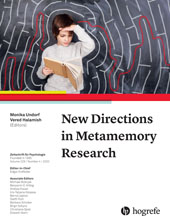References
(2009). Agenda-based regulation of study-time allocation: When agendas override item-based monitoring. Journal of Experimental Psychology: General, 138(3), 432–447. https://doi.org/10.1037/a0015928
(2013). Easily perceived, easily remembered? Perceptual interference produces a double dissociation between metamemory and memory performance. Memory & Cognition, 41(6), 897–903. https://doi.org/10.3758/s13421-013-0307-8
(2012).
Metamemory and memory efficiency in older adults: Learning about the benefits of priority processing and value-directed remembering . In M. Naveh-BenjaminN. OhtaEds., Memory and aging: Current issues and future directions (pp. 245–270). Psychology Press.(2015, January). After leaving a child in the car, “that pain never goes away”. CNN. https://www.cnn.com/2014/07/03/us/hot-car-deaths/index.html
(2015). Memory for medication side effects in younger and older adults: The role of subjective and objective importance. Memory & Cognition, 43(2), 206–215. https://doi.org/10.3758/s13421-014-0476-0
(2011). Monitoring one’s own forgetting in younger and older adults. Psychology and Aging, 26(3), 631–635. https://doi.org/10.1037/a0022852
(2018). Younger and older adults’ associative memory for medication interactions of varying severity. Memory, 26(8), 1151–1158. https://doi.org/10.1080/09658211.2018.1441423
(2019). Knowing what others know: Younger and older adults’ perspective-taking and memory for medication information. Journal of Applied Research in Memory and Cognition, 8(8), 481–493. https://doi.org/10.1016/j.jarmac.2019.09.004
(2011). Metacognition in later adulthood: Spared monitoring can benefit older adults’ self-regulation. Current Directions in Psychological Science, 20(3), 167–173. https://doi.org/10.1177/0963721411409026
(2004). Predicting one’s own forgetting: The role of experience-based and theory-based processes. Journal of Experimental Psychology: General, 133(4), 643–656. https://doi.org/10.1037/0096-3445.133.4.643
(2011). The ease of processing heuristic and the stability bias: Dissociating memory, memory beliefs, and memory judgments. Psychological Science, 22(6), 787–794. https://doi.org/10.1177/0956797611407929
(2007). The aging decision maker: Cognitive aging and the adaptive selection of decision strategies. Psychology and Aging, 22(4), 796–810. https://doi.org/10.1037/0882-7974.22.4.796
(2011). Betting on memory leads to metacognitive improvement in younger and older adults. Psychology and Aging, 26(1), 137–142. https://doi.org/10.1037/a0022681
(2016). Memory for allergies and health foods: How younger and older adults strategically remember critical health information. Journal of Gerontology: Psychological Sciences, 71(3), 389–399. https://doi.org/10.1093/geronb/gbv032
(2016). How beliefs can impact judgments of learning: Evaluating analytic processing theory with beliefs about fluency. Journal of Memory and Language, 93, 245–258. https://doi.org/10.1016/j.jml.2016.10.008
(2012). Information search and decision making: Effects of age and complexity on strategy use. Psychology and Aging, 27(4), 817–824. https://doi.org/10.1037/a0028744
(2016).
Judgments of learning . In J. DunloskyS. K. TauberEds., The Oxford handbook of metamemory (pp. 65–80). Oxford University Press. https://doi.org/10.1093/oxfordhb/9780199336746.013.4(2008). Memory predictions are influenced by perceptual information: Evidence for metacognitive illusions. Journal of Experimental Psychology: General, 137(4), 615–625. https://doi.org/10.1037/a0013684
(2009). Metacognitive illusions for auditory information: Effects on monitoring and control. Psychonomic Bulletin & Review, 16(3), 550–554. https://doi.org/10.3758/PBR.16.3.550
(2019). Cue integration in metamemory judgments is strategic. The Quarterly Journal of Experimental Psychology, 73(4), 629–642. https://doi.org/10.1177/1747021819882308



